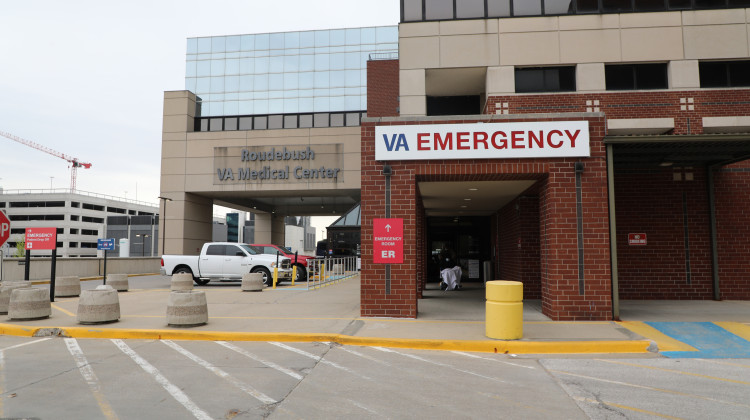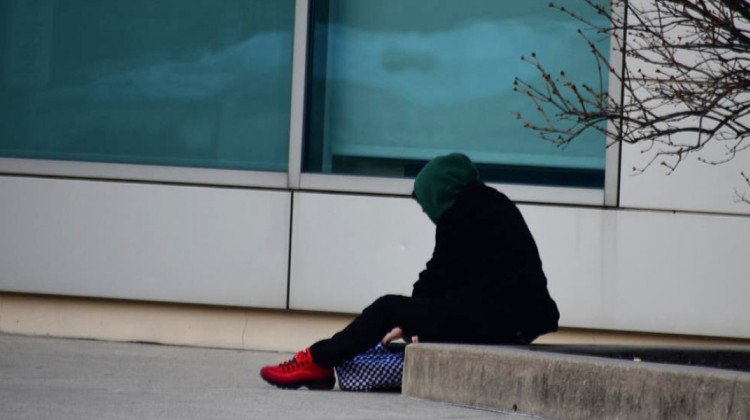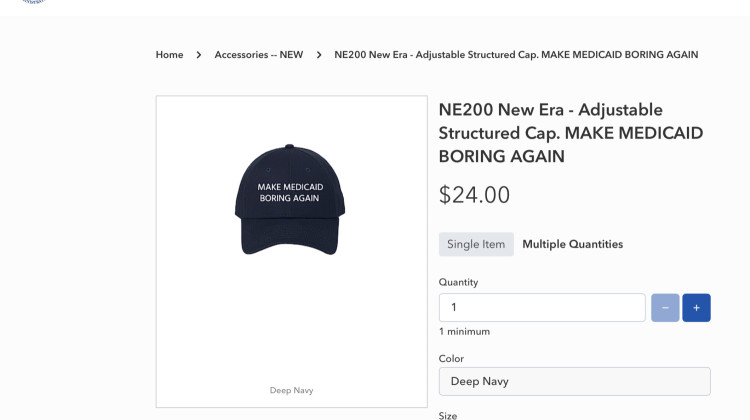
Silent No More founder Danyette Smith and Domestic Violence Network Executive Director Kelly McBride.
Jill Sheridan/WFYIDomestic violence incidents and deaths saw a sharp increase during the pandemic. One contributor is added stress, but there are numerous factors at work. Reporter Jill Sheridan covers this issue, and WFYI’s Taylor Bennet talked with her to learn more.
WFYI Morning Edition newscaster and reporter Taylor Bennett: Jill, you’ve been reporting on domestic violence trends for years -- and looking into the spike during the pandemic specifically. In Marion County some zip codes experienced as much as a 200 percent increase in domestic violence related 911 calls, and two of Indy’s mass shooting events this past year, were domestic violence related. What do we know so far about what is behind this increase?
WFYI city government and policy reporter Jill Sheridan: Yes, many attribute the increase to the fact that people have been confined together at home more. And people also lost jobs in the pandemic. That financial and emotional stress increased all levels of violence, the overall homicide rate is up as well.
Bennett: Was there a corresponding increase in help?
Sheridan: Absolutely, at the beginning of the pandemic there was, especially during the lockdown. Relief money housed families at hotels, and nonprofits collaborate more. But on the other side, some smaller grassroots groups couldn't offer help in person and had to focus on the direct needs of people. Some of the original relief money has waned. I spoke with the founder of Silent No More, a small nonprofit group, Danyette Smith. She told me many working on this issue are overwhelmed.
Silent No More founder Danyette Smith: I'm not only hearing, it I'm seeing it. Because we're boots on the ground, you know, we're in contact with those families we're at the scenes when there's a murder suicide or when there is a someone shot we connect with those families so we're
Sheridan: Smith is also a survivor. After 10 years with her ex she finally broke free educating herself on the system, the process and how to advocate for herself. She realized its hard for people to identify that they are in fact experiencing domestic violence, and after she was safe she realized her children also had trouble naming what they’d just been though.
Smith: And that's when I realized that they didn't know anything about domestic violence. So I then started asking their friends what did they know about domestic violence and they didn't know anything, let alone teen dating abuse. So that is when I thought OK, there’s people out here that know nothing about what so many people are going through.
Sheridan: She established her nonprofit to teach people to name domestic violence, and wanted to start with children, going into the schools, but her organization, like so many others, had to pivot during the pandemic. So she’s had to become a service provider, doing that boots on the ground work she mentioned, connecting people with housing or food, while also doing the advocacy work.
Bennett: It does seem like there has been an increase in campaigns and initiatives to address domestic violence.
Sheridan: Certainly in recent decades there is more general awareness and acceptance. Nonprofit programs like Danyette's can help close gaps. But more is needed on all levels, starting possibly with first responders. Danyette said her experience illustrates how difficult it can be to connect with help on that day they decide to leave.
Smith: When I decided that this was it on Feb. 6 of 2014, there were no... When I called the police, you know, the only thing that they said was go down and get a protection order. There was nothing that tells me what's next.
Bennett: Beyond helping people know where to go and who to call, what are other challenges?
Sheridan: People do need shelter, that’s a big one, and more established groups like the Domestic Violence Network can often help with that. But Executive Director Kelly McBride says more often people just need a helping hand, like legal assistance or utility help. She says they also don’t want to have to call the police.
Domestic Violence Network Executive Director Kelly McBride: They don't want law enforcement help. They want to rely on their communities, their churches, their friends, and their family and have community accountability for their perpetrator.
Sheridan: That can look like someone helping out with childcare, or relatives that will take in a family in or help out with money, or community members that can step in and help moderate the situation. But if they can’t rely on those channels, you may end up involving the legal system. McBride says that’s another challenge -- people need legal help. She told me most people show up alone, representing themselves, or in legal terms, a pro se, Latin for on one's own behalf.
McBride: If you are a pro se asking for a protective order, which 97% of individuals are, they don't have an attorney helping them with it. They don't know that you can ask for that. Or they don't know that if you do ask for that, it's going to result in a hearing because they have to have due process before you remove firearms, of course.
Bennett: That comment about protective orders, people are scared for their lives, a lot of these 911 calls end in death.
Sheridan: Yes, and a lot of that is related to guns. McBride says an increased number of domestic violence homicides are due to firearms. DVN recently released a report on this issue and found firearms responsible for almost three quarters of domestic violence deaths in 2020. But she says Indiana law provides only limited ways to seize firearms from someone at risk of using them. McBride told me that in court, often proceedings are cattle calls and numerous cases being heard at one time, and if the judge asks one defendant if they have a gun and they say they don’t… well it’s all based on the honor system.
McBride: Perpetrators are not dumb. They're pretty smart people. So, they're sitting there and they're hearing one person have to surrender their guns because they voluntarily said that they had a gun. You can bet your bottom dollar that nobody else has a gun in that courtroom.
Sheridan: She says, overall, more work must be done on the mental health and therapy side, because the issues that ultimately result in murder have much deeper roots.
McBride: So, we really need to start looking at trauma and how hurt people hurt people. And what does that look like? So, if we had more trauma informed care services, if we have more affordable mental health care or free mental health care, that's quality... those are some really key things that really would help
Sheridan: Of course access to mental health care, providers and response needs to be increased. Before the pandemic there was a shortage of mental health providers. The city of Indianapolis is allocating $30 million in American Rescue Plan money to mental health resources to help reduce violent crime including domestic violence.
Bennett: If you know someone who needs help getting away from an abusive relationship, more resources on our website with the story at wfyi.org/news. Thank you Jill.
That was WFYI’s Jill Sheridan and Taylor Bennett talking about the increase in domestic violence and how response efforts are working. People in Indiana may call 211 to find other resources. The Domestic Violence Network has other local resources listed.
Contact WFYI city government and policy reporter Jill Sheridan at jsheridan@wfyi.org. Follow on Twitter: @JillASheridan.
 DONATE
DONATE








 Support WFYI. We can't do it without you.
Support WFYI. We can't do it without you.